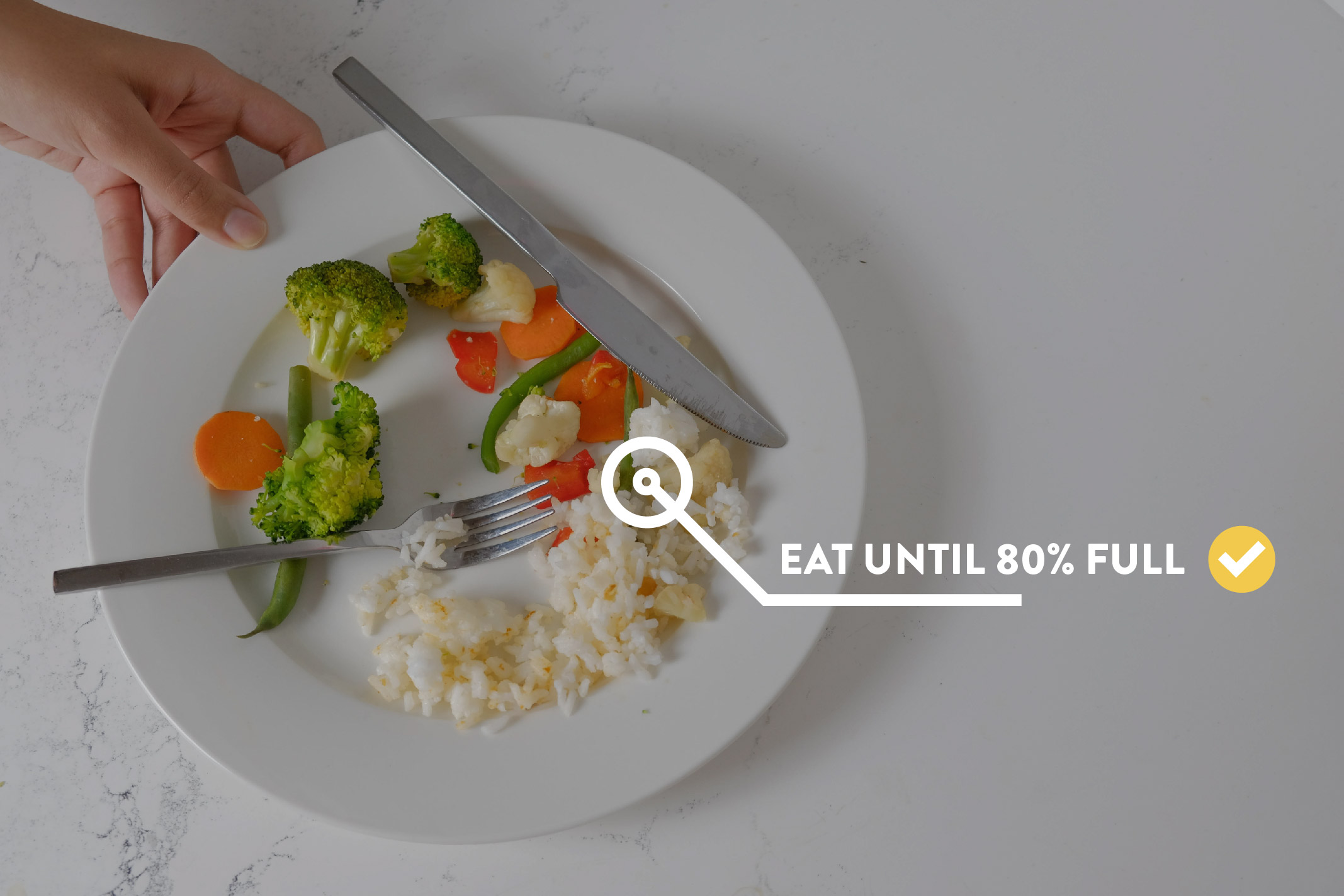It’s sometimes hard to know when we’ve reached being full enough. Most of our perceptions of “full” is of being stuffed or being unable to take another bite without feeling like our stomachs are literally going to explode. In fact, those feelings are indications of overeating. The habit we’re talking about is focused on practicing our awareness of what being fully satiated is. And that means checking in with our bodies while we are eating.
Hara hachi bu
Hara hachi bu is a saying and a cultural practice that exists in a region of Japan called Okinawa. People in Okinawa are among the healthiest and longest-living in the world. There are four times more centurions (people over 100 years old) in this region than typically found in America or Britain [1]. Hara hachi bu is typically translated as “eat until 80% full.”
This mantra can be heard uttered by Okinawan elders before eating. It serves as a reminder to be mindful with how full one is while having a meal, and in turn, to practice moderation by not overindulging. It makes sense why Okinawans live so long given that there is a growing body of evidence towards the benefits of low calorie diets [2]. Sounds great. Eat less, lose weight, and live longer and healthier. Great on paper, but can be very challenging
Eat until you’re no longer hungry, not until you’re full
So how do we know when we’re full, but not over-stuffed? The goal is to eat like the Okinawans—eat until you are 80% full, then stop. Or in their words, eat until you’re not hungry anymore, rather than until you’re brimming with fullness. In practice, one way to achieve this is to slow down when you eat. It can take 15-20 minutes for the sensory system in your stomach to send a signal to your brain saying it’s reached fullness. Stopping early allows your brain to catch up to your stomach.
Slow down, you move too fast
The tricky part about slowing down when you eat, is replacing the old habit of hoovering down everything on your plate (and maybe a second helping and dessert) within 20 minutes. Practically, what are good habits that help replace this behavior? You can suggest to your clients to replace the hoover habit with actionable replacement habits, such as:
- putting your utensils down after every bite
- practicing mindfulness and active meditation by not watching TV nor being on your electronics while eating
- having conversations interspersed throughout your meals with friends and family
- use smaller plates and tall narrow cups [3]. Using dishware like this prevents your food portions from being too large, and if you wait at least 15 minutes before getting a second serving, you can prevent the painfully slow delay in signaling your brain.
How do I help my clients build slow-eating habits?
When helping your client to craft their habit intention statement to implement this habit successfully, identify the times of day just before your client eats their meals. At those times have a reminder sent to them to keep their habit at the top of their minds. The auto messaging feature through Trainerize’s calendar system should be enough to help remind them of their intention before getting their “nom” on. Recall that a habit intention statement goes along the lines of:
“When I’m sitting down to eat (cue), I will remind myself to only eat to 80% fullness (behavior). When I eat to 80% fullness, I will then treat myself to a single piece of dark chocolate after dinner (reward).”
New habits are more likely to succeed if you keep the cue and reward as close to old ones as possible. That’s assuming your usual reward is not going to sabotage your client’s goal (eating an entire cake as a reward is unlikely to help you reach your goal—obviously).
Summary:
- Eating until 80% full has been shown to help the Okinawan people live longer and healthier lives.
- Slowing down while eating provides several benefits, such as feeling more satiated and satisfied with less food, and decreasing total caloric intake.
- A growing body of evidence supports calorically-restricted diets to in some form to support a long healthy life.
- Using Trainerize’s auto messaging feature will help prompt clients to remember to eat until 80% full.
References:
- http://news.bbc.co.uk/2/hi/uk_news/magazine/7250675.stm
- https://www.scientificamerican.com/article/the-hunger-gains-extreme-calorie-restriction-diet-shows-anti-aging-results/
- https://www.bluezones.com/2017/12/hara-hachi-bu-enjoy-food-and-lose-weight-with-this-simple-phrase/

